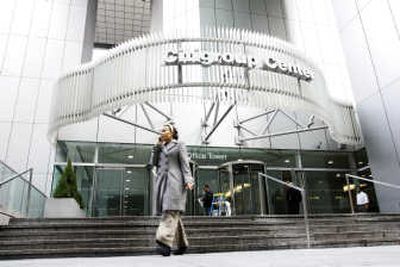Citigroup will shed $500 billion in assets

NEW YORK – Citigroup Inc. said Friday it aims to shed about $500 billion in assets and grow revenue by 9 percent over the next few years, as it tries to rebound from massive losses tied to deterioration in the mortgage and credit markets.
The anticipated rise in revenue will derive largely from cutting costs – which Chief Financial Officer Gary Crittenden said will mean more job reductions. Citi has so far lowered its work force by 13,200 people since last summer.
The plans are the most concrete yet by Vikram Pandit, nearing his five-month anniversary as the bank’s CEO, to prove himself a capable turnaround specialist at a company that many claim was struggling long before the housing market collapse.
The bank’s plans to wind down its $2.2 trillion in assets to approximately $1.7 trillion were part of an investor day presentation at one of Citigroup’s Manhattan offices.
These so-called “legacy assets” included yet-to-be-named non-core businesses, as well as assets in Citigroup’s securities and consumer banking segments, including mortgages and other real estate-related holdings.
Already, the bank has written down assets tied to soured debt by some $38 billion since last summer. It has also announced plans to reduce its residential mortgage assets by $45 billion over the coming year, and has recently sold businesses including CitiCapital, CitiStreet and Diners Club. All of those write-downs and sales are included in the larger $500 billion figure.
Citigroup has been under heavy investor scrutiny over the past year as the value of its stock tumbled. Many Citigroup holders have been angling for a large-scale overhaul of the company’s structure.
Those shareholders’ hopes, however, are dwindling, with executives apparently largely keeping the bank’s major parts intact.
Pandit did emphasize, “Our structure is different.” But he also said, “We believe the right model is a global universal bank.”
Citigroup executives pointed out several shortcomings at the bank that need to be fixed. And it introduced a new slogan as part of its revamping efforts: “Citi never sleeps.”
But the road to recovery is going to be a difficult one.
Most analysts believe that while the bulk of the bank’s write-downs are through, there are still at least some more to come. In a note Thursday, Deutsche Bank analyst Mike Mayo estimated that Citigroup’s $29 billion bucket of mortgage investments and related structured products has the potential to result in another $15 billion write-down.
And given that Citigroup has $63 billion in exposure to home equity loans, $150 billion to mortgages, $21 billion to auto loans, and other exposure to consumer loans such as credit cards, Mayo estimated that the bank will have to build up its reserves by an additional $5 billion.
Amid substantial turmoil in the credit markets, Citigroup generated $13.22 billion in revenue during the first quarter – 48 percent less than the $25.46 billion it generated during the first three months of 2007.